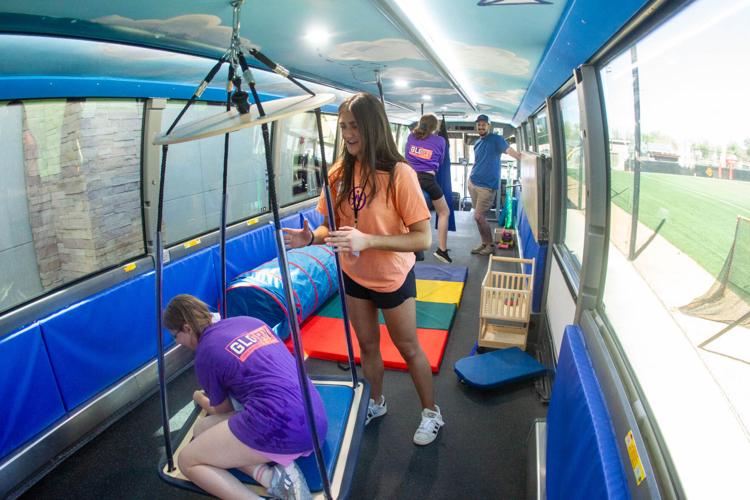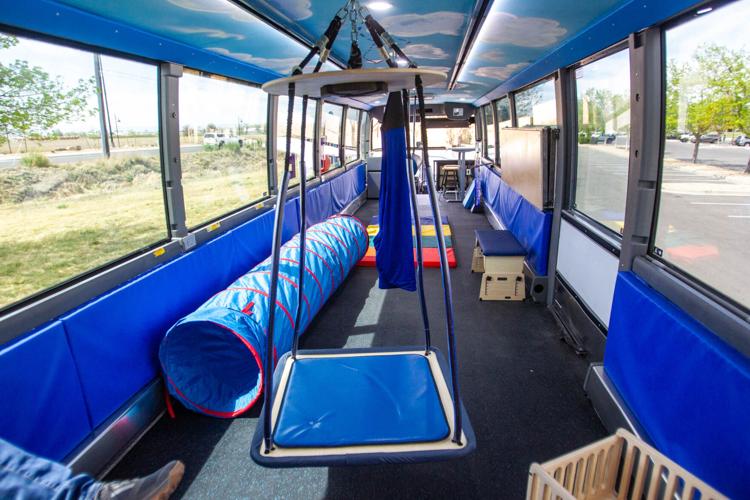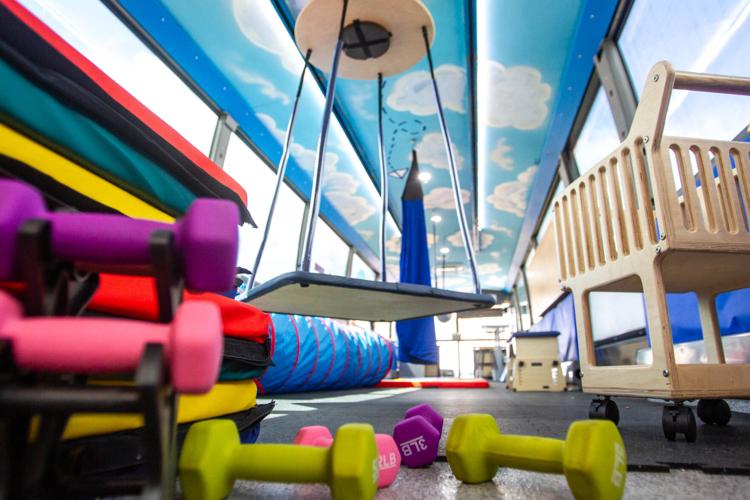Hannah Thomas jolted when her two-and-a-half-year-old son, Wyatt, made a random plea in 2018:
“Help me, please.”
It was the last thing Wyatt said to his mother before a nearly three-year streak of absolute silence.
“We worked with our pediatrician, and … she sent us for an evaluation, which ended up diagnosing him with autism. He was behind in speech, so non-verbal, and in his fine motor and gross motor skills.”
Now nine years old, Wyatt is able to speak in full sentences, which Thomas said is a huge milestone, and she’s thankful for the support that made it possible. But, his fine and gross motor skills remain comparatively unrefined.
Thomas attributed Wyatt’s strides in speaking to the dedicated speech therapist he has seen for about six years, adding that he’d have made similar progress in motor skills if Wyatt were able to access an occupational therapist as often as they had their speech therapist.

Larry Robinson / The Daily Sentinel
The inside of the Adaptive Heroes bus seen on April 25, 2025. The mobile clinic boasts an array of equipment, including a blue platform swing (center), which is often used in occupational and pediatric physical therapy. The swing’s instability encourages patients to develop their balance, reaction time, coordination and “motor planning.”
But, in total, Wyatt has only been able to obtain just over a year’s worth of occupational therapy across the six years of attempts.
“Luckily, our speech therapist that we had was great and was able to incorporate some of those (motor) skills, but that’s not her specialty,” Thomas said. “We got another occupational therapist, and she was really good. We had her for about six months, and then she left.”
“So, eventually I just gave up with some of that occupational therapy because … he was able to access some of those services through the school district,” she added. “It’s not much, I mean, maybe 20 minutes a week, but it was better than nothing and being on a wait list.”
Thomas added that she and Wyatt are lucky, as many people in their position have not had the same luck finding a consistent speech therapist.
In fact, consistent access to occupational, speech and physical therapy is a common struggle for western Colorado youth with intellectual and developmental disabilities.

Larry Robinson / The Daily Sentinel
The exterior of the Adaptive Heroes bus seen on April 25, 2025. The bus, a 45-foot-long motor coach, was remodeled to serve as an on-the-road physical, verbal and occupational therapy unit to bridge the gap for kids with special needs who require any of the therapies, which are in short supply across much of western Colorado.
HOLDING OUT FOR A HERO
Lincoln Folkers, president of Adaptive Heroes, has been working on a solution: a remodeled school bus, equipped with everything necessary to travel across the Western Slope, bringing critical therapy services directly to the youth who need it most.
After nearly two years of fundraising, research and renovation, the unique resource is ready to hit the road.
“It’s a full therapy gym. We’re able to go to Delta, Hotchkiss, Paonia, Crawford and areas where they’re driving two to three hours just to get to therapy services and bring it within 10 minutes of where they’re at,” Folkers said. “We spend two days there, serve everybody who needs to be served in the community, pull out, and the next week, we’re back in that same community.”
Folkers started pitching mock-ups of the mobile clinic to funders in the area, catching the Western Colorado Community Foundation’s attention. The foundation connected Folkers with a donor who offered $25,000 – if Folkers could raise enough money to match it within 90 to 120 days.
He went on to raise that money in just 45 days, which impressed a third donor to the extent that they provided an additional match, giving Folkers a total of $75,000 to start the project.

Larry Robinson / The Daily Sentinel
The inside of the Adaptive Heroes bus seen on April 25, 2025. The bus, a 45-foot-long motor coach, was remodeled to serve as an on-the-road physical, verbal and occupational therapy unit to bridge the gap for kids with special needs who require any of the therapies, which are in short supply across much of western Colorado.
The substantial donations enabled him to purchase a 56-seat bus from Detroit, of which he “gutted everything except what makes it drive.”
Folkers added that it took about seven months to transform the bus, chipping away at renovations and equipment purchases as they raised more money. However, fundraising for the bus was only half the work Folkers would have to do for a successful launch.
“I would not let the bus go into service until I had six months of operating capital and salary in the bank,” Folkers said. “The reason is that if we let it go into service, and then we run out of money, I’ve just put them on a year-long waiting list to get into a clinic. I can’t do that.”
The mobile clinic soft-launched last month, which Folkers said is important to identify and correct any operational wrinkles while they hire and/or train a full staff. According to him, the bus will be at about 50% capacity by May, with a full launch by October or November.
Sooner than later, Folkers added that he intends on expanding capacity to serve adults with similar needs and lack of access.

Kids with the Fellowship of Christian Athletes play on the Adaptive Heroes bus while it’s parked at Colorado Mesa University on April 27, 2025. Adaptive Heroes Founder and Director Lincoln Folkers said engaging youth with the wonders of therapy provision is the first step in a career pipeline that develops a stronger workforce in the future.
IMMEDIATE & LONG-TERM SOLUTIONS
In the meantime, Folkers said he is working on two of the clinic’s other goals: education and capacity building. He added that developing the workforce through those avenues is critical to bolstering access in the long run, since so few therapists live in the region.
“We’re having to think long term. Get them into the pipeline, work with them while they’re in school and refine our own therapists,” Folkers said. “Then, as they come out of school, we have options for them: we’ve got this, this and this; we’ll give you a job today. You want to work?”
He added that Adaptive Heroes will engage high schoolers at job fairs, facilitate resources for higher education and offer field work experience (under the precept of a fully licensed therapist), which is a requirement for obtaining doctorates in the specialized therapies.
In the future, Folkers said he aims to help many of those students establish their own brick-and-mortar clinics in western Colorado’s most underserved areas.
Adaptive Heroes has already signed an affiliation agreement with Colorado Mesa University and is currently facilitating field work for two students. Folkers added that other institutions have expressed interest in partnering, including Colorado State University and Western State University.

Weights await use inside the Adaptive Heroes bus seen on April 25, 2025. The bus, a 45-foot-long motor coach, was remodeled to serve as an on-the-road physical, verbal and occupational therapy unit to bridge the gap for kids with special needs who require any of the therapies, which are in short supply across much of western Colorado.
Aside from the actual service provision and education, Folkers aims to develop Colorado’s understanding of the intellectually and developmentally disabled population by collecting patient data.
“When I can sit in front of whoever (can influence change) and say, ‘Here are the numbers, here’s who we’re not serving; here’s who is faltering because they’re not getting services; here’s who isn’t worried about their kid’s health, they’re worried about what they’re gonna feed them,’ That’s where the magic happens,” Folkers said. “That’s when you start changing things.”
Long-term aside, Thomas said the Adaptive Heroes Clinic’s launch offers substantial hope for her, Wyatt and thousands of other families like them across western Colorado.
“I’m just extremely grateful that this will provide access to not just kids like my own, but to adults with disabilities as well who wouldn’t necessarily have access to these services either,” she said.
Readers can learn more by visiting adaptiveheroes.org.

















